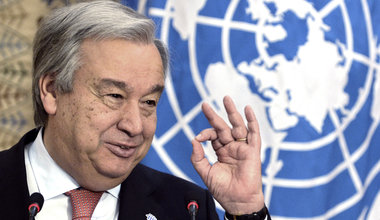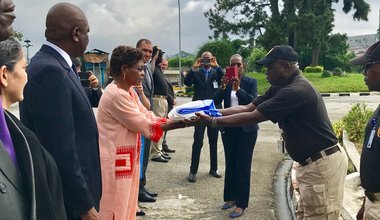Daily Brief on Cote d'Ivoire for Friday, 28 September 2007
Highlights
-Military Governor of Moyen Cavally holds meeting on mobile courts
-UNOCI organizes public forum at Tiassale
-Sharp increase in Seguela crime rates causes Forces Nouvelles and UNOCI concern
Mobile Court hearings
A public meeting was yesterday organised by the Military Governor of Moyen Cavally in western Cote d'Ivoire, to explain how, when and where the mobile courts for identification will be held in the region. During the meeting, which was attended by UNOCI military and civilian personnel based in Duékoué, the Sub-Prefect explained that they were facing difficulties with regard to the resumption of the mobile courts. He said that magistrates had not yet been deployed in the region, but expressed the hope that the timetable, once agreed, would not be unduly delayed.
Information and sensitisation
UNOCI's Public Information Office (PIO) today organised a public forum in Tiassale, a town some 80 kilometres north of Abidjan that is known as an example of social cohesion in Cote d'Ivoire. Speaking on behalf of the OIC of the Mission, the Chief Political Affairs Officer Modem Lawson-Betum congratulated the inhabitants on their ability to be united in their differences and urged then to continue to support the peace process which, he said, had recently made some significant strides. He assured them that UNOCI and the international community would continue to support Ivorians until a lasting peace returned to their country.
Military
BANBATT peacekeepers from UNOCI's Odienné camp yesterday provided protection and security to teams of military and civilian engineers constructing the Disarmament, Demobilisation and Reinsertion (DDR) site in the city.
Security
The sharp increase in crime in the Seguela area was the main topic of discussion at a meeting between UNOCI military and civilian personnel and members of the Forces Nouvelles (FN) yesterday. Participants pledged to work tirelessly to reduce the crime rate.
Visits
Sector East Commander Brigadier General Tariq Javed yesterday visited Sector West Headquarters in Daloa, where he was briefed on the present situation in the sector.
The new Regional Administrative Officer (RAO) for Sector West has been touring the sector to meet military and civilian staff. Yesterday she was in San Pedro
Representatives from Force HQ Engineering Cell and Civil Engineering Section in Sector West yesterday visited UNOCI's Seguela camp to carry out reconnaissance in connection with plans to expand the camp to accommodate an additional company.
Human Rights
On 24 September, a 32-year-old woman victim of sexual harassment and other forms of threat and intimidation since 2002 by her 60-year-old landlord told the Regional Human Rights Office in Yamoussoukro that she feared for her safety and asked for protection. The Office advised her to file a complaint at the police station.
On 26 September, the Regional Human Rights Office in the western town of Duékoué reported that the leader of Liberian refugees based in Danané had been receiving death threats since 2 August, from an FAFN soldier of Liberian origin. The soldier is blaming him for having disclosed information to the United Nations High Commissioner for Refugees on his affiliation to the Mouvement Patriotique Ivoirien du Grand Ouest (MPIGO) which resulted in the denial of his refugee status. The Office addressed the case with the local military authorities.
On 26 September, the Chief of the Human Rights Division, Mr. Simon Munzu, participated in the launching of the Etats Généraux of the Convention de la Société Civile Ivoirienne (CSCI) in Treichville (Abidjan district). The 57 organizations members of the CSCI expressed concern about quasi-institutionalized racketeering and corruption practices. Among the participants were the Deputy Special Representative of the Secretary General, Mr. Georg Charpentier, representatives of the African Union, the Economic Community of West African States (ECOWAS), the American and Ghanaian Embassies, NGOS, traditional chiefs, religious leaders and members of various political parties.
 ONU
ONU Nations Unies Maintien de la paix
Nations Unies Maintien de la paix



